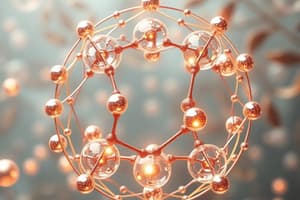Podcast
Questions and Answers
What are valence electrons?
What are valence electrons?
Electrons in the outermost shell
How are cations formed?
How are cations formed?
Loses valence electrons
How are anions formed?
How are anions formed?
Gains valence electrons
What is the fundamental property of metal elements?
What is the fundamental property of metal elements?
Can you ALWAYS tell what an element is based on the number of neutrons?
Can you ALWAYS tell what an element is based on the number of neutrons?
Can you ALWAYS tell what an element is based on the number of electrons?
Can you ALWAYS tell what an element is based on the number of electrons?
Can you ALWAYS tell what an element is based on the number of electrons in a neutral atom?
Can you ALWAYS tell what an element is based on the number of electrons in a neutral atom?
Can you ALWAYS tell what an element is based on the number of protons?
Can you ALWAYS tell what an element is based on the number of protons?
What is made when an atom loses electrons?
What is made when an atom loses electrons?
What is made when an atom gains electrons?
What is made when an atom gains electrons?
What is the only liquid metal at room temperature?
What is the only liquid metal at room temperature?
What is the only liquid nonmetal at room temperature?
What is the only liquid nonmetal at room temperature?
Which subatomic particle was discovered first, second, and third?
Which subatomic particle was discovered first, second, and third?
Who discovered electrons?
Who discovered electrons?
Who discovered protons?
Who discovered protons?
Who discovered neutrons?
Who discovered neutrons?
Flashcards are hidden until you start studying
Study Notes
Valence Electrons
- Valence electrons are located in the outermost shell of an atom and play a key role in chemical bonding.
Cations
- Cations are formed when an atom loses valence electrons, resulting in a positively charged ion.
Anions
- Anions are formed when an atom gains valence electrons, resulting in a negatively charged ion.
Metal Elements
- Metals are characterized by their tendency to lose electrons easily, which is a fundamental property of these elements.
Neutrons vs. Elements
- An element cannot always be identified by the number of neutrons alone, as different isotopes exist.
Electrons vs. Elements
- The number of electrons does not always reveal an element's identity due to the presence of ions and isotopes.
Neutral Atoms and Electrons
- The identity of an element can be determined by the number of electrons in a neutral atom, as they are equal to the number of protons.
Protons and Elements
- The number of protons in an atom is definitive for identifying an element, as each element has a unique atomic number.
Positive Ions
- Positive ions, known as cations, are produced when an atom loses one or more electrons, resulting in a surplus of protons.
Negative Ions
- Negative ions, known as anions, are created when an atom gains one or more electrons, leading to a surplus of electrons.
Liquid Metal
- Mercury is the only metal that is liquid at room temperature, distinguishing it from other metals.
Liquid Nonmetal
- Bromine is notable as the only nonmetal that exists as a liquid at room temperature.
Discovery of Subatomic Particles
- Electrons were discovered first by J.J. Thompson, followed by protons discovered by Ernest Rutherford, and neutrons identified by James Chadwick.
Contributions of Scientists
- J.J. Thompson is recognized for the discovery of electrons, while Rutherford is credited with discovering protons, and Chadwick discovered neutrons.
Studying That Suits You
Use AI to generate personalized quizzes and flashcards to suit your learning preferences.



